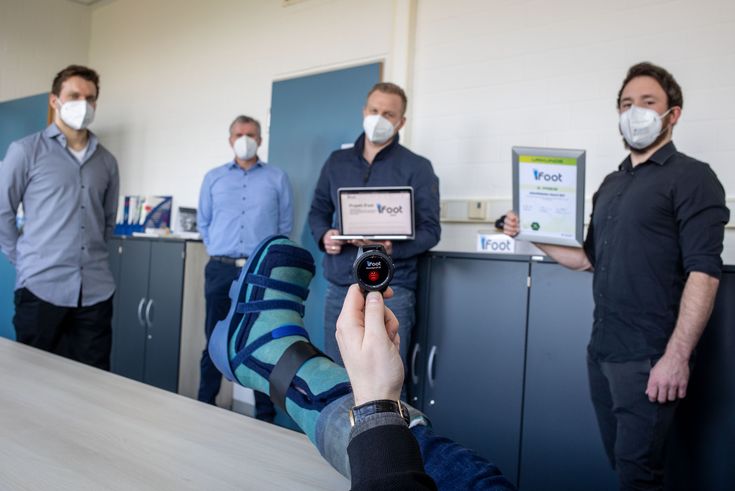Thanks to modern sensor technology, patients with diabetic foot syndrome should be able to receive better treatment in future. This is the aim of the iFoot research project, which is based at the Faculty of Health Care at Hochschule Niederrhein. The project has now been distinguished as one of five innovative digital projects at the Bytes4Diabets Award. The eleven-member jury of diabetes experts honoured it at a digital award ceremony at this year's DiaTec, a specialist congress for diabetes technology and digitalization in diabetes therapy.
The scientists developed a system solution designed to improve the care of patients with diabetic foot syndrome. The bandage, which is equipped with sensors, measures medically relevant values on the foot of the affected person and transmits these to a smartwatch. Here, the values measured on the foot are subjected to an initial emergency-specific analysis. If the values are poor, an alarm signal is sent via the smartwatch.
On the watch, the sensor data records from the foot are supplemented with additional vital parameters and forwarded in this combination to a patient-specific data pool via a mobile network. This is where advanced AI-based data analysis takes place, with the specific aim of avoiding complications and improving the healing process. Data and analysis results are made available to patients and practitioners via a cloud solution using a smartphone and PC-compatible app.
"The iFoot association is what we are looking for," said Nico Richter, Head of Healthcare Research and Innovation at the health insurance company DAK-Gesundheit, in his laudatory speech. In his welcoming address to the award winners, Richter made it clear that for the jury there was an "incredibly high probability" that the iFoot bandage could prevent diabetic foot syndrome from escalating in many cases.
Professor Dr. Hubert Otten, Head of the Competence Center eHealth at The Hochschule Niederrhein and responsible for the iFoot project, emphasized the relevance of the joint project: "We want to make a contribution to improving the healing process of diabetic feet," he said. "With consistent prevention, it is possible to avoid a high proportion of the 40,000 amputations performed each year due to diabetic foot syndrome. This is where our innovative bandage can help and alleviate the human suffering often associated with the widespread disease diabetes."
The iFoot project consortium consists of the Cologne Center for Integrated Diabetes Therapy (CID GmbH), St. Vinzenz Hospital Cologne, PI Proballigence GmbH and the CCeHealth competence center at the Faculty of Health Care at Hochschule Niederrhein. It is supported by the Initiative Chronische Wunden (ICW), the Netzwerk Diabetischer Fuß e.V., sanaFactur GmbH and Vodafone GmbH. The project, which is funded by the state of North Rhine-Westphalia and the EU, has a total budget of 1.5 million euros and will run for three years.
Project manager: Prof. Dr. Hubert Otten, hubert.otten(at)hs-niederrhein.de
















